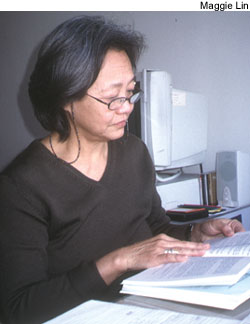|
Other stories on Periscope: |
Lending a hand
By Maggie Lin
Though the sex trade is one of the world’s oldest professions, its workers are conferred little status in society. “People should accept the life they have chosen, as well as respect them as human beings,” said an outreach worker commenting on common attitudes towards sex workers.
Zi Teng, an organization advocating sex workers’ rights, published a survey in November 2002 on the attitudes of local university students toward sex workers. Some 53.7 percent of the interviewees reported having negative views of them, while less than 10 percent had a positive view.
Action for Reach Out is another organization concerned with the situation of sex workers.
“Our services range from legal assistance to medical care. We inform women of their legal rights and help them find legal representation,” said Lalen Velasco, an outreach worker for Reach Out.
“On medical issues, we educate women on the importance of protection by conducting seminars on the dangers of sexually transmitted diseases, such as HIV.
“We offer our support by accompanying them to social hygiene clinics for regular health checks.”
In addition to regular check-ups, the women take extra precautions by getting vaginal examinations and blood tests for syphilis, HIV and hepatitis B.
The number of sex workers seeking guidance is increasing.
“We provide assistance for an average of 600 women per month,” Ms. Velasco said.
They now have 25 peer educators to educate women on prevention awareness and HIV/Aids.
The contraction of sexually transmitted diseases will not be prevented until all clients accept the desire of sex workers to practice safe sex.
Eleanor A. Holroyd, professor in The Nethersole School of Nursing at The Chinese University of Hong Kong and vice-chairperson of the executive committee at Reach Out, said, “For cultural reasons, some men are reluctant to wear condoms during sexual intercourse.”
In addition to being susceptible to sexually transmitted diseases, many sex workers deal with substance abuse problems as well.
In a 2002 drug study, Reach Out reported that more than 87 percent of sex workers are regular drug users.
“Indeed, drugs and alcohol are the biggest health risks sex workers face.
“This is in large part due to their low self-esteem,” said Prof. Holroyd.
Lin Chew, chairperson of Reach Out, agreed.
“Sex workers have always been looked down on.
“They are a group that is being victimized, marginalized, excluded and isolated.”
In order to change the social status of sex workers, Ms. Chew said, “The most important thing is to help them build up their self-esteem, though this is not an easy thing to do.”

Lin Chew is the chairperson of Action of
Reach Out.